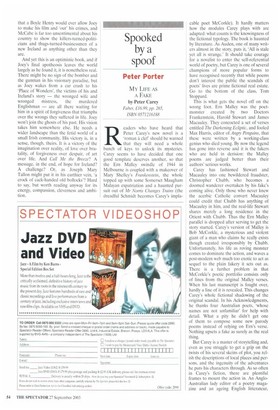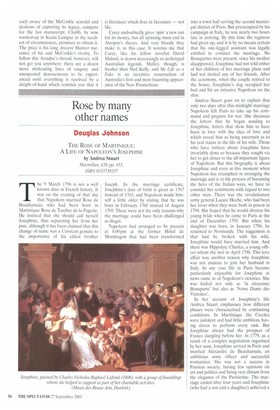Spooked by a spoof
Peter Porter
MY LIFE AS A FAKE by Peter Carey Faber, £16.99, pp. 265, ISBN 0571216188 Readers who have heard that Peter Carey's new novel is a 'roman a clef' should be warned that they will need a whole bunch of keys to unlock its mysteries. Carey seems to have decided that one good template deserves another, so that the Ern Malley swindle of 1944 in Melbourne is coupled with a makeover of Mary Shelley's Frankenstein, the whole topped up with some Somerset Maugham Malayan expatriation and a haunted pursuit out of Mr Norris Changes Trains (the dreadful Schmidt becomes Carey's impla
cable poet McCorkle). It hardly matters how the modules Carey plays with are adapted: what counts is the knowingness of the fictional typology. The book is haunted by literature. As Auden, one of many writers almost in the story, puts it, 'All is stale yet all is strange.' It should take courage for a novelist to enter the self-referential world of poetry, but Carey is one of several champions of more popular forms to have recognised recently that while poems don't interest the public the scandals of poets' lives are prime fictional real estate. Go to the bottom of the class, Tom Stoppard.
This is what gets the novel off on the wrong foot. Ern Malley was the poetmonster created by two Doctors Frankenstein, Harold Stewart and James Macauley. They concocted a set of verses entitled The Darkening Ecliptic, and fooled Max Harris, editor of Angry Penguins, that these were written by a working-class genius who died young. By now the legend has gone into reverse and it is the fakers who are held in derision: the Malley poems are judged better than their authors' serious works.
Carey has fashioned Stewart and Macauley into one bewildered fraudster, Christopher Chubb, who becomes a doomed wanderer overtaken by his fake's coming alive. Only those who never knew the acerbic Catholic convert Macauley could credit that Chubb has anything of Macauley in him, and the real-life Stewart shares merely a long residence in the Orient with Chubb. Thus the Ern Malley parallel is dropped after serving to get the story started. Carey's version of Malley is Bob McCorkle, a mysterious and violent giant of a man who claims he really exists though created irresponsibly by Chubb. Unfortunately, his life as roving monster comes to dominate the action, and waves a post-modern web much too exotic to act as sequel to the plain fakery it sets out as. There is a further problem in that McCorkle's poetic portfolio consists only of lines from the original Malley verses. When his last manuscript is fought over, hardly a line of it is revealed. This changes Carey's whole fictional shadowing of the original scandal. In his Acknowledgments, he thanks four Australian poets, 'whose names are not unfamiliar' for help with detail. What a pity he didn't get one of them to compose some new parody poems instead of relying on Em's verse. Nothing upsets a fake as surely as the real thing.
But Carey is a master of storytelling and, even as you struggle to get a grip on the twists of his several skeins of plot, you relish the descriptions of local places and persons, and the ingenuity of the adventures he puts his characters through. As so often in Carey's fiction, there are plentiful frames to mount the action in. An AngloAustralian lady editor of a poetry magazine and an ageing English litterateur, each aware of the McCorkle scandal and desirous of capturing its legacy, compete for the last manuscript. Chubb, by now washed-up in Kuala Lumpur in the seediest of circumstances, promises to obtain it. The price is his long Ancient Mariner narrative of his and McCorkle's rivalry. To follow this Ariadne's thread, however, will not get you anywhere: there are a dozen more misleading lines of enquiry and unexpected denouements to be experienced until everything is resolved by a sleight-of-hand which reminds you that it
is literature which lives in literature — not life.
Carey undoubtedly gives 'spin' a new run for its money, but all spinning must end in Atropos's shears. And very bloody they make it, in this case. It worries me that Carey, like his fellow novelist David Malouf, is drawn increasingly to archetypal Australian legends. Malley, though, is fresher than Ned Kelly, and My Life as a Fake is an inventive resurrection of Australia's first and most haunting appearance of the New Prometheus.



























































































 Previous page
Previous page